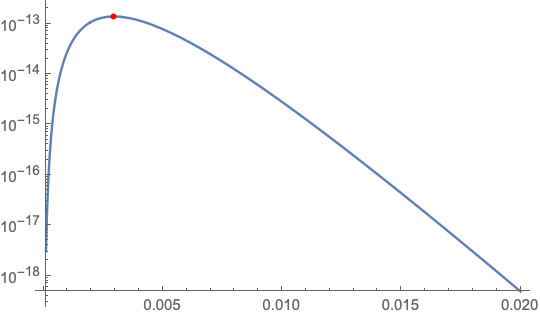This is a precision issue.
$Version
(* "12.0.0 for Mac OS X x86 (64-bit) (April 7, 2019)" *)
Since you used a machine precision number (i.e., 0.5) in the integrand, the integration is done with only machine precision.
Integrate[E^(-16/x^8^(-1) - (2*x)/(0.5)^9)/x^(9/8), {x, 0, Infinity}]
(* -0.0824979 *)
Using exact numbers
int = Integrate[E^(-16/x^8^(-1) - (2*x)/(1/2)^9)/x^(9/8), {x, 0, Infinity}]
(* (1/(2^(3/4) \[Pi]^(
7/2)))MeijerG[{{}, {}}, {{-(1/8), 0, 1/8, 1/4, 3/8, 1/2, 5/8, 3/4, 7/
8}, {}}, 262144] *)
If this complicated result is converted to a number using machine precision
int // N
(* 0.0270485 *)
However, using arbitrary-precision
int // N[#, 20] &
(* 5.6160550672798812373*10^-16 *)
Comparing with numerical integration
int = NIntegrate[E^(-16/x^8^(-1) - (2*x)/(1/2)^9)/x^(9/8), {x, 0, Infinity}]
(* 5.61606*10^-16 *)
This value is consistent with the earlier arbitrary-precision result and does not change with increased precision.
int = NIntegrate[E^(-16/x^8^(-1) - (2*x)/(1/2)^9)/x^(9/8), {x, 0, Infinity},
WorkingPrecision -> 20]
(* 5.6160550672798812757*10^-16 *)
Looking at the integrand
max = NMaximize[
{E^(-16/x^8^(-1) - (2*x)/(1/2)^9)/x^(9/8),
x > 0}, x, WorkingPrecision -> 20]
(* {1.3826054145707193900*10^-13, {x -> 0.0029477253331967126781}} *)
LogPlot[E^(-16/x^8^(-1) - (2*x)/(1/2)^9)/x^(9/8), {x, 1*^-4, 2*^-2},
WorkingPrecision -> 20,
Epilog -> {Red, AbsolutePointSize[4],
Point[{x /. max[[2]], Log@max[[1]]}]}]

Consequently, a small value for the integration is expected.



